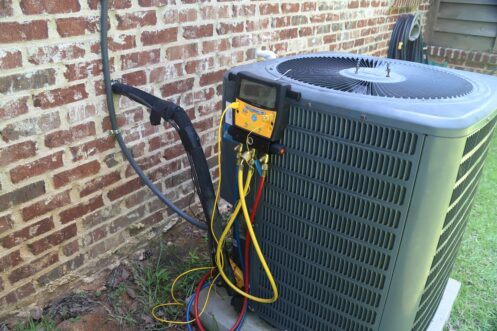If you’ve lived here in Raleigh, NC, for very long, you already know that we have humid summers. Even in the winter months, the average humidity never drops below 60%. However, you may not know how that humidity affects your HVAC system and its ability to keep you comfortable. In the summer, high humidity can put excess strain on your HVAC. In the winter, your home’s humidity may fall to the point that it gets uncomfortable. The reason has to do with how your home’s HVAC system works. Here’s a look at the interesting science behind how humidity and your HVAC interact and what you can do to ensure your home’s humidity always stays at an acceptable level.
What Is Humidity?
Put simply, humidity is a measure of how much water vapor the air in a given place contains. Water vapor ends up in the air due to natural evaporative processes taking place in the environment. However, when you hear someone talking about humidity, it’s important to know if they’re referring to absolute humidity or relative humidity.
Absolute humidity is the result of a mathematical equation that divides the amount of water vapor by the amount of dry air that exists in a predetermined volume of air at a given temperature. It’s a measurement used mostly by scientists to investigate the properties of the environment.
Relative humidity, by contrast, is an expression of the ratio of absolute humidity to the highest potential absolute humidity the air can achieve. Since hotter air can hold more water vapor, the relative humidity scale fluctuates based on how hot or cold it is outside. This is the scale most weather forecasts refer to since it provides an accurate representation of the real humidity level of the outdoor air. It also makes it possible for you to judge how likely it is to rain when you look at a forecast. The closer the relative humidity climbs to 100%, the greater the odds it will rain.
How Does Humidity Affect Your Comfort?
Although you probably know that the more humid it gets outside, the less comfortable you feel. Most people in Knightdale, NC refer to humid conditions as feeling muggy or stifling. Those terms are more accurate than you may realize. The reason you feel that way in humid conditions has to do with how our bodies regulate temperature.
When we get hot, our bodies begin releasing sweat. This begins happening long before you can even notice it and increases in volume as your body temperature increases. The reason for that is the fact that water, which is the primary component of sweat, absorbs heat energy and eventually evaporates. When it does, it carries the absorbed heat energy away from your body, cooling it down.
However, when the air around your body is already saturated with water vapor, there’s nowhere for your sweat to evaporate. As a result, humans tend to feel warmer on humid days because the humidity interferes with our built-in cooling mechanism.
Humidity and Your HVAC
Now that you know that air temperature influences how much water vapor the air can hold, you should understand one of the ways that humidity and your HVAC system interact. In the winter, as your home’s air gets colder, it becomes less able to hold on to moisture. As your HVAC heats the air inside your home, it gets hotter but doesn’t have any moisture added to it in the process. That’s when your home’s hot, moisture-starved air goes looking for moisture anywhere it can find it, including from your skin!
In the winter, the air in your home will start drawing moisture from your skin as soon as the relative humidity falls below 40%. The further below that level the relative humidity falls, the more pronounced the effect. This is one of the reasons so many people report experiencing itchy, dry skin in the wintertime.
In the summer, the opposite happens. Since hot air can hold onto moisture, and moist air makes you feel hotter, your HVAC has to work harder to cool you down. It does this, in part, by extracting moisture from the air in your home. Inside your home’s indoor HVAC unit, there’s an evaporator coil. While your HVAC runs, hot, moist air from your home passes over the coil while a cold refrigerant cycles through it. As the air cools down, it begins surrendering the moisture it holds in the form of condensation. This is why your HVAC has a condensate line, which you’ll often see dripping water outside your home while your HVAC runs.
However, there’s a limit to how much moisture your AC can extract from the air as it operates. This means your home’s relative humidity may remain at or above 60% in the summer, even as your HVAC continues extracting moisture from the air. When it’s too humid in your home, you will need to turn your thermostat down more to remain comfortable. This not only runs up your home’s energy bills but adds additional wear and tear to your HVAC system.
Maintaining Ideal Humidity in Your Home
For optimal comfort, it’s recommended that your home remain between 40% and 60% relative humidity year-round. Here in Raleigh, that’s typically easy enough in the winter. While your home’s humidity may fall slightly below that ideal range when it gets cold, it is typically possible to remedy the problem by placing a standalone humidifier in the room where you spend most of your time. In the summer, however, keeping your home below 60% humidity is more challenging.
At the peak of summer, we see relative humidity levels that reach an average of 78%. On those days, it’s all but certain that your home will be far more humid than it should be. The best way to remedy that is to augment your HVAC’s moisture removal capabilities with a whole-house dehumidifier. This is a device that attaches to your HVAC ductwork and removes additional moisture from your home’s air. Best of all, they work automatically, so once you set your desired humidity level, they’ll activate to get the air leaving your HVAC to the right humidity before it reaches your home’s vents. This will improve your home’s comfort while cutting its energy bills through reduced demand on your HVAC.
Your Trusted Local HVAC Partner
If you believe your Raleigh home has a humidity problem, Thermo Direct can help. We offer comprehensive HVAC services, including installation, repair, and maintenance. Our trained and certified HVAC technicians can help you correct your home’s humidity level to ensure your comfort all year round. Plus, we offer complete residential plumbing services, too, should your home develop issues with its pipes, fixtures, and water infrastructure. We also offer indoor air quality, insulation, and ductwork services, too. And as a Better Business Bureau-accredited business with an A+ rating, you can always count on top-notch customer service and workmanship when you deal with us.
So, if you’d like to discuss solutions to your Raleigh home’s humidity issues, contact Thermo Direct today!









